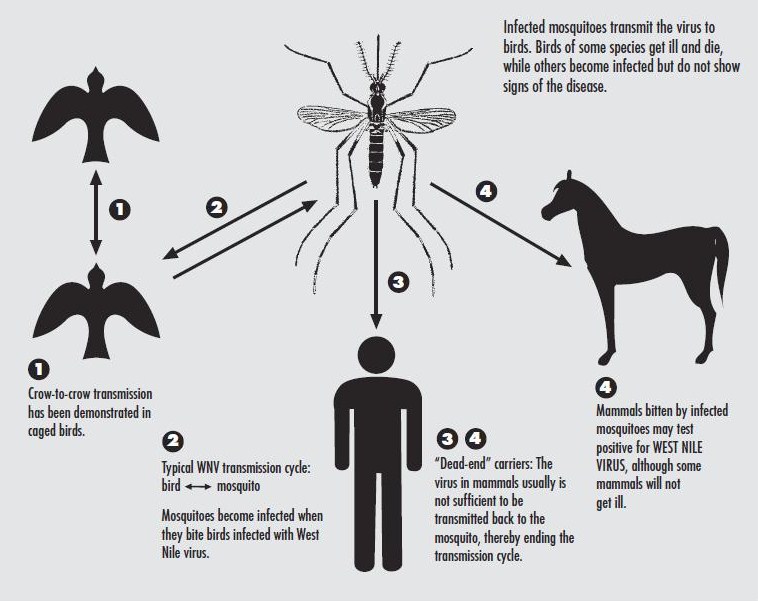The first three lethal cases of West Nile virus infection in 2017 have been announced by health officials in California. The mosquito-borne virus has spread through the majority of the U.S., and it has affected at least 20 people this year.
According to state health officials, these three individuals were from Los Angeles, San Bernardino, and Kern counties. Los Angeles County health officials said that the local victim, who specifically was from the San Fernando Valley area, was hospitalized in early August after suffering from the neuroinvasive disease.

The West Nile virus season usually begins when the climate gets warmer, between summer and fall. The DuPage County Health Department is advising people to take the necessary measures to prevent mosquitoes’ bites, in particular on this Labor Day weekend. According to Health Department Executive Director, Karen Ayala, the health department reminded people to “Fight the Bite” and to protect themselves and their families from this dangerous illness.
Only three states don’t present any virus activity, according to the Centers for Disease Control and Prevention. Even if there is not a vaccine to prevent the virus, or medications to treat the disease, around 1 in 5 people infected with the virus do not develop any of its symptoms. However, around 1 in 150 people who are infected develop a serious illness that could be lethal.
Mosquitoes are not the only animals able to carry the virus. It is also common in birds, but it is transmitted by mosquitoes after they bite them. According to the CDC, if a person ever gets infected by the illness, it might develop a high fever, headache, neck stiffness, stupor, disorientation, coma, tremors, convulsions, muscle weakness, vision loss, numbness, and paralysis.
“West Nile virus can cause a deadly infection in humans, and the elderly are particularly susceptible,” said the director of the state Department of Public Health, Karen Smith. “August and September are peak periods of West Nile virus transmission in the state, so we urge everyone to take every possible precaution to protect themselves against mosquito bites.”
West Nile virus is in almost all states
People from the majority of states in the country present chances to get infected by the West Nile virus (WNV), according to a WNV Activity & Surveillance graphic from the CDC. Just three states do not present any WNV activity, and eleven present a non-human WNV activity.
California has been the only state with fatal WNV victims this year, the Georgia Department of Public Health announced that the state has had nearly 20 human cases of West Nile virus.
According to the director of Environmental Health for the agency, “Georgians can reduce the number of mosquitoes around their homes and yards by getting rid of standing water,” said Chris Rustin in a statement. “Standing water is a breeding ground for mosquitoes that may be infected with West Nile virus and other mosquito-borne diseases.”

This year, the CDC has reported that a total of 45 states, along with the District of Columbia, present WNV infections in birds, mosquitoes, and people – representing a total of 450. Out of all these cases, 269 of them – which means the 60 percent – were classified as neuroinvasive disease (such as meningitis or encephalitis), and 181 – or the 40 percent – were classified as non-neuroinvasive disease.
Experts say that California hadn’t presented such an amount of mosquitoes carrying WNV – as we see it this year – in the last five years. This might be due to the heavy rains in the region. Last year, 19 people were reported dead due to the West Nile virus.
Early this year, the CDC collected an overall of 2,038 cases of people infected with the West Nile virus.
Precautions to prevent the West Nile virus
To deal with infected mosquitoes, it is necessary that people empty containers or any item that holds stagnant water. This way, the mosquitoes can’t get inside to lay eggs. However, if the person can’t get rid of the water container, it’s better to treat them with larvacides.
Dr. Jeffrey Gunzenhauser, MD, the county’s interim health officer said that the “West Nile virus is a serious disease that can lead to hospitalization, death and long-term disability, especially in older adults and people with weak immune systems,” said the health official. “Everyone should take precautions against mosquitoes by using insect repellent containing an effective ingredient such as DEET, and eliminating any standing water around their home where mosquitoes can breed.”
Source: Los Angeles Times
